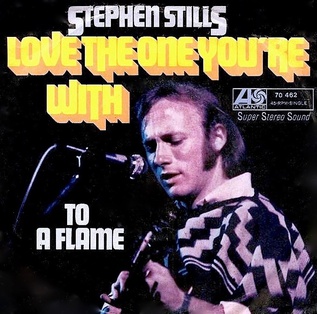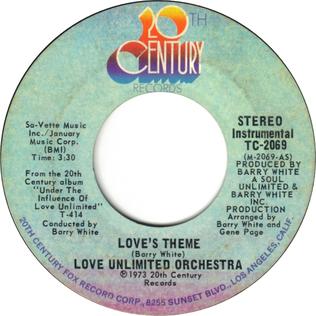
Barry Eugene Carter, better known by his stage name Barry White, was an American singer and songwriter. A two-time Grammy Award winner known for his bass voice and romantic image, his greatest success came in the 1970s as a solo singer and with the Love Unlimited Orchestra, crafting many enduring soul, funk, and disco songs such as his two biggest hits: "Can't Get Enough of Your Love, Babe" and "You're the First, the Last, My Everything".

"I'll Be There" is the first single released from Third Album by The Jackson 5. It was written by Berry Gordy, Hal Davis, Bob West, and Willie Hutch.

"I Will Always Love You" is a song written and originally recorded in 1973 by American singer-songwriter Dolly Parton. Written as a farewell to her business partner and mentor Porter Wagoner, expressing Parton's decision to pursue a solo career, the country single was released in 1974. The song was a commercial success for Parton, twice reaching the top spot of the US Billboard Hot Country Songs chart: first in June 1974, then again in October 1982, with a re-recording for The Best Little Whorehouse in Texas soundtrack.

Love Unlimited was a female vocal trio that provided backing vocals for American singer-songwriter Barry White on his albums and concert tours. They also found success with their own recordings.

"Love You Inside Out" is a 1979 hit single by the Bee Gees from their album, Spirits Having Flown. It was their last chart-topping single on the Billboard Hot 100, interrupting Donna Summer's "Hot Stuff", becoming the third single from the album to do so. In the UK, the single peaked at No. 13 for two weeks. It was the ninth and final number-one hit for the Bee Gees in the US, and the twelfth and final number-one hit in Canada as well. The trio would not return to the top 10 for ten years, with the song, "One".
"I Only Have Eyes for You" is a romantic love song by composer Harry Warren and lyricist Al Dubin, written for the film Dames (1934) when Dick Powell introduced it. Several successful recordings of the song were made in 1934; later, there were charted versions by the Flamingos (1959) and Art Garfunkel (1975).

"Love the One You're With" is a song by American folk rock musician Stephen Stills. It was released as the lead single from his debut self-titled studio album in November 1970. The song, inspired by a remark Stills heard from musician Billy Preston, became his biggest hit single, peaking at No. 14 on the Billboard Hot 100 in early 1971. David Crosby and Graham Nash, Stills' fellow members of Crosby, Stills & Nash, provide background vocals on the song. Also providing the backups are Rita Coolidge, her sister Priscilla Jones, and John Sebastian. They all sing the "Do Dos" that come before the instrumental portion and the Outro. The song was also recorded by the Isley Brothers, The Meters, Bucks Fizz, Luther Vandross, Bob Seger and Richard Clapton, among others.

"Love's Theme" is an instrumental piece written by Barry White around 1965. Recorded and released as a single by White's Love Unlimited Orchestra in 1973, it was one of the few instrumental and purely orchestral singles to reach #1 on the Billboard Hot 100 chart in the United States, which it did in early 1974. Billboard ranked it as #3 on the Year-End Hot 100 singles of 1974.
"Practice What You Preach" is the title of a number-one R&B single by singer Barry White, written by White, Gerald Levert, Edwin Nicholas, from White's 1994 album The Icon Is Love. The hit song spent three weeks at number-one on the US R&B chart and reached 18 on the pop chart. It became a gold record. The 1994 single also won a Soul Train Music Award for Best R&B/Soul Song of the Year.

"Superwoman" is a song by R&B singer Karyn White, released as the second single from her self-titled debut album in January 1989. It was her second U.S. top ten hit, peaking at number eight, and her second U.S. R&B number-one hit, holding that position for three weeks. It also earned a gold certification from the Recording Industry Association of America (RIAA).

"Love Machine" is a 1975 single recorded by Motown group the Miracles, taken from their album City of Angels. The song was a number-one hit on the Billboard Hot 100, and the biggest-selling hit single of the Miracles' career. This single was one of two Billboard Hot 100 top-20 hits recorded by The Miracles with Billy Griffin as lead vocalist; the other is 1973's "Do It Baby". Griffin had replaced Miracles founder Smokey Robinson as lead singer in 1972. The song features a growling vocal by Miracle Bobby Rogers, with group baritone Ronnie White repeating "yeah, baby" throughout the song.
"(Come 'Round Here) I'm the One You Need" is a 1966 hit single by Motown group The Miracles, released on Motown Records' Tamla label.

"Baby I Love You" is a popular song by R&B singer Aretha Franklin. The only single release from her Aretha Arrives album in 1967, the song was a huge hit, peaking at number 4 on the Billboard Hot 100 Singles chart and spending two weeks at number-one on the Hot Rhythm & Blues Singles chart. In the UK, the song rose to number 39 in August 1967, spending four weeks on the chart. It was featured in Martin Scorsese's 1990 film Goodfellas. A live performance appears on the album Aretha in Paris (1968).

"Do It Baby" is a 1974 single recorded and released by the Motown R&B group The Miracles. The song was taken from the album of the same name, and written by Motown staff songwriters Freddie Perren and Christine Yarian and produced by Perren.

"I Want to Be Your Man" is a song by American funk singer-songwriter Roger Troutman, from his third studio album Unlimited!. It was released as the lead single from the album in September 1987 by Reprise Records. The song was co-written by Roger's brother, Larry Troutman, and produced by Roger, who conceived of the song as a statement on romantic commitment. "I Want to Be Your Man" features Roger singing in both his natural tenor and his trademark talk box.
"Funny How Time Slips Away" is a song written by Willie Nelson and first recorded by country singer Billy Walker. Walker's version was issued as a single by Columbia Records in June 1961 and peaked at number 23 on the Hot C&W Sides chart. The song has been featured in several live action films and television shows, such as in the first episode of the second season of AMC’s Better Call Saul and in the 2020 Netflix drama The Devil All the Time.

The Way We Were is the thirty-second studio album by American pop singer Andy Williams, released in the spring of 1974 by Columbia Records and was a return to singing songs that his audience was already familiar with after Solitaire, his previous LP that was less reliant on covers of recent pop hits, did not perform well.

Walkin' in the Rain with the One I Love was an R&B single in 1972 for the soul trio Love Unlimited, a studio group created by singer/producer Barry White. The main vocalists were female singers Glodean James, her sister, Linda James, and their cousin Diane Taylor. Glodean would eventually become White's wife in 1974; the couple would split up in 1988, though they never divorced.
"Under the Influence of Love" is a song written by Paul Politi and Barry White. Felice Taylor had a minor hit with it in 1967.

Sheet Music is the self-produced eleventh album by American R&B singer Barry White, and the second release on his own CBS-affiliated custom label, Unlimited Gold. Although it peaked at #19 in the R&B charts, it was a commercial disappointment. "Love Makin' Music" was the most successful of the single releases, peaking at #25 in the R&B charts. White also recorded this track as well as "She's Everything to Me" in Spanish for the Latin-American market as "Mi nueva canción" and "Ella es todo para mí" respectively. The London branch of CBS Records went for "Rum and Coke" as the second single, but as none of his singles on his new labels had managed to reach the UK Singles Charts, they stopped releasing any further singles off any of his following 4 albums. The Netherlands belatedly released the track "Ghetto Letto" as a single in August 1981, choosing it over White's then current single "Louie Louie".















